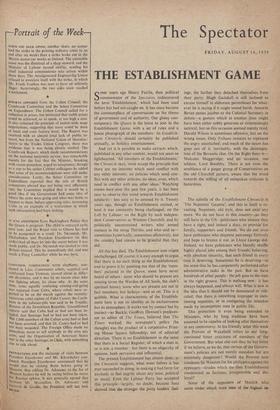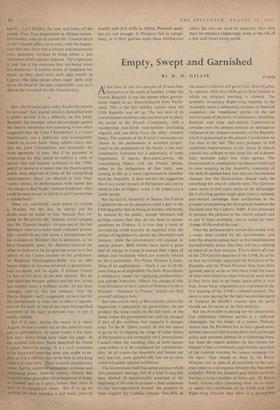THE ESTABLISHMENT GAME OME years ago Henry Fairlie, then political
a commentator of the Spectator, rediscovered the term 'Establishment,' which had been used before but had not caught on. It has since become the commonplace of conversation on the theme of government and of authority. Our glossy con- temporary the Queen is the latest to join in the Establishment Game, with a set of rules and a house photograph of the members : its Establish- ment Chronicle should certainly be published annually, as holiday entertainment.
And yet it is possible to make extracts which, published in any other context, would not seem so lighthearted. 'All members of the Establishment,' the Chronicle says, 'must accept the principle that there are no interests which need conflict with any other interests; no policies which need con- flict-with any other policies; no ideas, even, which need to conflict with any other ideas.' Watching events here over the past few years, it has been easy to observe this trend towards Establishment solidarity : less easy to be amused by it. Twenty years ago, though an Establishment existed, at least it was constantly being challenged; on the Left by Labour; on the Right by such indepen- dent Conservatives as Winston Churchill; and by politically uncommitted writers who sensed menace in the smug Thirties, and who said so— sometimes hysterically, sometimes offensively, but the country had reason to be grateful that they did.
All this has died. The Establishment now reigns unchallenged. Of course, it is easy enough to argue that there is no such thing as the Establishment; and to prove it by pointing out that of the 'mem- bers' pictured in the Queen, some have never heard of others: some who should be present are missing (even the Warden of All Souls, the club's spiritual home); some who are present are not in fact members, but lackeys—and so on. This is a quibble. What is characteristic of the Establish- ment here is not its identity or its exclusiveness but its atmosphere. It works not by contact but by instinct—as Buckle, Geoffrey Dawson's predeces- sor as editor of The Times, believed that The Times worked; the newspaper's policy (he thought) was the product of a corporative Print ing House Square fellowship; not of editorial. direction. There is no Establishment in the sense that there is a Social Register, of which a man is, or is not, a member : but there is an oligarchy of opinion, both pervasive and influential.
The present Establishment has almost done, as the Chronicle suggests, what none before it has ever succeeded in doing: in making it bad form for anybody to feel angrily about any issue, political or social. Even the Labour Party has accepted this principle—largely, no doubt, because Suez showed that the stronger the party leaders' feel- ings, the farther they detached themselves from their party. Hugh Gaitskell is still inclined to excuse himself in elaborate parentheses for what- ever he is saying if it might sound harsh. Aneurin Bevan passes jujubes to the Colonial Secretary in debate—a gesture which at another time might have been either nobly generous or entertainingly satirical, but on this occasion seemed merely tired, Harold Wilson is sometimes offensive, but on the wrong issues. Only Tribune remains to represent the angry unattached; and much of the steam has gone out of it, inevitably, with the disintegra- tion of the Bevanite clan. On the Right there is— Malcolm Muggeridge; and on occasion, too seldom, Lord Boothby. There is not even the semblance of a ginger group of Conservatives on the old Churchill pattern, aware that the trend towards the stifling of all outspoken criticism is hazardous.
The subtitle of the Establishment Chronicle is 'The Nepotists' Gazette'; and this in itself is re- vealing. Nepotism, old style, does not exist any more. We do not have in this country—...as they still have in the US—politicians who assume they have a right, and indeed a duty, to provide for family, supporters and friends. We do not even have politicians who dispense patronage furtively and hope to brazen it out, as Lloyd George did. Instead, we have politicians who blandly shuffle highly placed jobs among their friends; believing, with absolute sincerity, that each friend in every case is deserving. Sometimes he is deserving—in the sense that he has competently performed other administrative tasks in the past. But so have hundreds of other people: the job goes to the man in the right groove. This is nothing new : it has always happened, and always will. What is new is the idea that it should not be denounced or ridi- culed; that there is something improper in men- tioning nepotism, or in castigating the mistakes made by incompetent men in public life.
This protection is even being extended to Ministers, who by long tradition have been assumed to be capable of looking after themselves in any controversy. In his friendly letter this week the Provost of Wakefield refers to our long- continued bitter criticisms of members of the Government. But what else can they be but bitter if we believe, as we do, that certain of the Govern- ment's policies are not merely mistaken but are extremely dangerous? Would the Provost now condemn Sir Winston for his philippics against the appeasers—tirades which the then Establishment condemned as factious, irresponsible and dis- loyal?
Some of the appeasers of Munich who came under attack were men of the highest in-
tegrity-----Lord Halifax, for one; and today all the people, from Tory imperialists to African nation- alist leaders, who go to consult Mr. Lennox-Boyd at the Colonial Office come away with the impres- sion that they have met a sincere and honourable man, genuinely anxious to bring about a just settlement of all colonial disputes. The impression is just; but if the measures that are•being taken are disastrous—if endless errors of judgment are made, as they were with such ugly results in Cyprus—the time comes when anger spills over on to the head of the man responsible—just as it did on the wretched Neville Chamberlain.
But—the Provost asks—why should the attacks he personal? Any journal which is dissatisfied with a public servant is in a difficulty on this point. Recently, for example, when the campaign against the theatre censorship was mounting, it was often suggested that the Lord Chamberlain is a Court functionary, not a politician, and consequently unable to answer back. Many editors knew, too, that the Lord Chamberlain was personally the most agreeable of men. But if he persisted in employing his blue pencil to enforce a code of morals that had become irrelevant in the 1950s, and if by doing so it meant that the theatre-going public were deprived of some of ,the outstanding contemporary plays, yet allowed to visit 'blue' variety shows, or performances with names like No Nudes is Bad Nudes' without hindrance, what could be done except to call the Lord Chamberlain a dunderhead?
There are, admittedly, cases where to criticise a Minister for the way he carries out his duties must be unfair to him, because they im- pinge on his private life. Nobody would imagine that Mr. Duncan Sandys—to take one of the few Ministers who have been much criticised person- ally—would be any the worse a businessman for his mistakes as Minister; but to denounce, as we have frequently done, the Attorney-General for what we believe to he his grievous errors as a law officer of the Crown touches on his profession. Sir Reginald Manningham-Buller was an able lawyer before he became involved in government, and no doubt will be again, if fortune frowns on him or his party at the next election, But on that tightrope between politics and the law, which has toppled many a brilliant career, he has been unhappy and—in this last instance, over the Devlin Report—sadly misguided; to have led for the Government in what was in effect a repudia- tion of the work of one of the most distinguished members of the legal profession was, to put it mildly, unwise.
But it is easy, during the recess in a warm August, to cast a cooler eye on the political scene and its personalities. In recent weeks it has been less easy; many things have made for anger. In the original Spectate». Steele described his friend Captain Sentry as saying, 'It is a civil cowardice to be backward asserting what you ought to ex- pect, as it is a Military fear to be slow in attacking when it is your duty.' There is much complacency today, fed by economic prosperity at home and continuing peace, however uneasy, abrOad. But anybody who remembers what happened in India, in Ireland, and in Cyprus, knows that there is little to be complacent about : that if we go on making the same mistakes it will mean years of
trouble and civil strife in Africa. Personal quali- ties are not enough; if Ministers fail in compe- tence, or if their policies make them mischievous (often the two are hard to separate), then they must be attacked unsparingly, even at the risk of a few wild blows being struck.



































 Previous page
Previous page